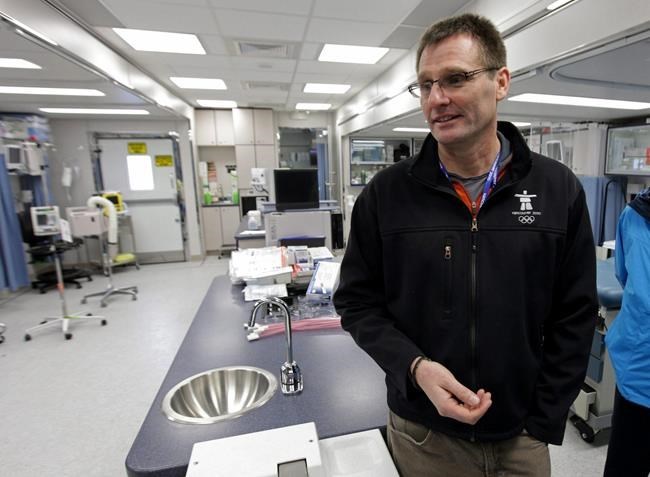The explosion of COVID-19 cases amid the new highly contagious Omicron variant couldn't come at a worse time for the 2022 Beijing Olympics.
Less than seven weeks before the Games open on Feb. 5, outbreaks have slammed the NBA, NFL and NHL, forcing some NHL teams to close shop entirely over the holiday break in hopes of halting the spread.
How confident is Canada's Olympic team doctor that the country's top winter athletes can compete safely in China? Or that Beijing organizers can pull off the Games safely at all?
"I get asked this question before every Games I think," Dr. Mike Wilkinson said with a laugh. "The way I look at it is we've learned an incredible amount as this pandemic has gone on. And we've learned an incredible amount even since Tokyo (Olympics this past summer).
"If I didn't think that we could do this safely, and that we put the mitigating measures in place, I wouldn't be confidently saying yes, we can get a team in safely and get them out safely. And importantly, get them back home without either being infected or bringing transmission into Canada. I do think that measures work, I do think we can do it."
There were no positive tests among Canada's team of 371 athletes in Tokyo. Marathoner Dayna Pidhoresky was required to quarantine in her hotel room in Japan for two weeks before racing, after a passenger on her flight tested positive for the virus.
"Our biggest issue to be honest, was the close contact rules when people were coming into Japan," Wilkinson said in an interview Tuesday with The Canadian Press. "From the Japanese point of view, they were doing their utmost to limit any transmission from anyone coming into Japan, into their population across the Games. And that worked."
It goes without saying, the key to Beijing will be avoiding a positive test, both at the Games, and in these final key weeks of preparation.
The IOC has implemented tighter safety measures for Beijing, including making surgical masks or N95 masks mandatory. Cloth masks no longer cut it. While participants aren't required to be vaccinated, there's a mandatory three-week quarantine upon arrival in China for those unvaccinated that has "made it almost impossible to compete if you're not vaccinated," Wilkinson said.
All Games participants including athletes, coaches, officials, media and others will remain in a "closed loop" bubble while in Beijing, and be tested regularly.
Wilkinson shot down talk of a three to five-week quarantine for anyone testing positive in Beijing, saying that was a rumour that the IOC has since emphatically dismissed.
There are two layers of quarantine, affecting either individuals who were close contacts, and those who test positive. Close contacts will be quarantined in their own accommodation with enhanced testing and safety measures.
Someone who tests positive will be put into isolation until they can produce two negative tests, "and depending on if it's symptomatic or asymptomatic, (either) a designated isolation hotel, or actually end up having to go to hospital, and then they will be tested every day."
The Canadian team staff implemented its own safety measures at the Tokyo Games, which were pushed back a year because of the pandemic. Among them: Canada had its own gym, and its own bicycles to move about the athletes village. In Beijing, they'll have a staff member in each of the three villages whose job is to monitor and maintain proper sanitation.
"We learned some good information from (Tokyo) about the increased number of contaminants in some of the communal spaces. So, things like the OCOG (Olympic organizing committee) gym compared to the Canadian gym. There was a 3- to 400-fold increase in contaminates in some of the OCOG spaces and things like the community bicycles that were available in Tokyo."
Heading into a non-pandemic Olympics, the COC would have done numerous site visits already, but having not been an option, Wilkinson said they'll evaluate the safety of spaces such as the dining hall in the athletes village once they arrive.
Athletes are heading into the homestretch of their Beijing preparation. They're training and competing and travelling abroad, and many still have to qualify for the Games.
Among the communication to athletes, Wilkinson said, they're encouraged to get booster vaccines, and with the cross-Canada rollout he said they'll all be able to get one before boarding flights to Beijing. The entire Canadian Olympic and Paralympic teams are already required to be double vaccinated to compete.
And, particularly heading into the holidays, athletes are encouraged to tighten up their bubbles, to avoid contact with cases.
Wilkinson, who was the director of medical services for the 2010 Vancouver Games — where the H1N1 virus threatened to wreak havoc — said staying on top of information and being able to pivot among the shifting landscape is key.
"We've said before, we're going to continue to see new variants across the world through this pandemic, in fact it’s almost now endemic. And each one we have to adapt, and we have to put in all the learnings we’ve had before in order to manage it," he said.
The running joke is: "We put a plan in place, but as soon as I've pushed send, we have to change it simply because we learn more, and more things become available," he said.
"(I'm) not gonna be bored. Let's put it that way."
This report by The Canadian Press was first published Dec. 21, 2021.
Lori Ewing, The Canadian Press



